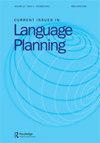维持和振兴俄克拉荷马州公立学校的土著语言:语言政策和规划中的教育主权
IF 1.8
1区 文学
Q2 EDUCATION & EDUCATIONAL RESEARCH
引用次数: 1
摘要
摘要作为致力于俄克拉荷马州土著教育的土著学者,我们采用非殖民化的方法来思考俄克拉荷马39个土著民族如何维护教育主权,以维持土著高中生的语言和文化身份。为了促进维持和振兴土著语言的教育模式,我们要问:1)俄克拉荷马州的土著民族如何通过政策、计划和对高中生的服务来参与语言规划并解放教育主权?以及2)在可能支持或限制公立高中土著语言教育的教育政策中,土著民族如何驾驭俄克拉荷马州的教育语言?我们认为俄克拉荷马州公立高中教室的功能是振兴和开垦土著语言的场所。我们讨论了支持语言振兴的土著教育主权是如何与俄克拉荷马州实施的教育政策中重叠且经常相互竞争的语言相互作用的。本文的目的是与参与语言规划的土著民族、教育工作者和政策制定者分享知识。最后,我们建议如何支持俄克拉荷马州土著学生、社区和语言的文化维持和振兴教育模式。本文章由计算机程序翻译,如有差异,请以英文原文为准。
Sustaining and revitalizing Indigenous languages in Oklahoma public schools: educational sovereignty in language policy and planning
ABSTRACT As Indigenous scholars committed to Indigenous education in Oklahoma, we use a decolonizing approach to consider how the 39 Indigenous Nations in Oklahoma assert educational sovereignty to sustain Indigenous high school students’ linguistic and cultural identities. Seeking to promote education models that sustain and revitalize Indigenous languages, we ask: 1) How do Indigenous Nations in Oklahoma engage in language planning and liberate educational sovereignty through policies, programs, and services to their high school students? and 2) How do Indigenous Nations navigate Oklahoma state education language-in-education policies that may support or restrict Indigenous language education in public high schools? We consider the function of Oklahoma public high school classrooms as sites of Indigenous language revitalization and reclamation. We discuss how Indigenous educational sovereignty to support language revitalization occurs in interaction with overlapping and often competing language-in-education policies imposed by the state of Oklahoma. A goal of this article is to share knowledge with Indigenous Nations, educators, and policy makers who are involved in language planning. We conclude with recommendations of ways to support culturally sustaining and revitalizing education models for Indigenous students, communities, and languages in Oklahoma.
求助全文
通过发布文献求助,成功后即可免费获取论文全文。
去求助
来源期刊

Current Issues in Language Planning
Multiple-
CiteScore
4.80
自引率
16.70%
发文量
26
期刊介绍:
The journal Current Issues in Language Planning provides major summative and thematic review studies spanning and focusing the disparate language policy and language planning literature related to: 1) polities and language planning and 2) issues in language planning. The journal publishes four issues per year, two on each subject area. The polity issues describe language policy and planning in various countries/regions/areas around the world, while the issues numbers are thematically based. The Current Issues in Language Planning does not normally accept individual studies falling outside this polity and thematic approach. Polity studies and thematic issues" papers in this journal may be self-nominated or invited contributions from acknowledged experts in the field.
 求助内容:
求助内容: 应助结果提醒方式:
应助结果提醒方式:


